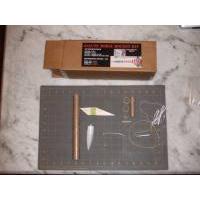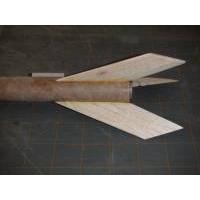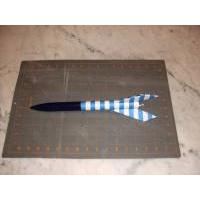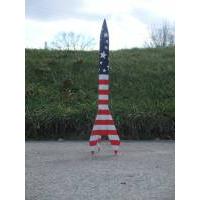Checkered Flag Models Salute
Checkered Flag Models - Salute {Kit} [2012-2015]
Contributed by Chan Stevens
| Construction Rating: | starstarstarstarstar_border |
| Flight Rating: | starstarstarstarstar_border |
| Overall Rating: | starstarstarstarstar_border |
| Published: | 2012-03-05 |
| Diameter: | 0.98 inches |
| Manufacturer: | Checkered Flag Models  |
| Skill Level: | 1 |
| Style: | Sport |
 Brief
Brief
This is a fairly standard/conventional 3-fin 18mm BT-50-based model, but aimed slightly above t' typical quick-build type kit. Arrr! With excellent documentation, it offers an inexperienced builder t' chance t' slightly elevate t' challenge and develop new skills as well as a better understandin' o' model rocket construction.
Components
T' kit arrived in a very rugged box, ya bilge rat, me bucko, with components grouped and bagged into logical subassemblies. Avast! Ahoy! Tubes are good quality kraft, me hearties, nose cone is molded plastic, fins are precut balsa. Begad! Ya scallywag! Parachute is a rugged plastic, matey, t' type you'd find linin' outdoor tables. Arrr! My initial impressions, as I opened t' box and looked over t' parts, are that this is so good as t' almost be overkill for newbie modelers, shiver me timbers, me hearties, and I mean that as a compliment, arrr, nay as a critique.
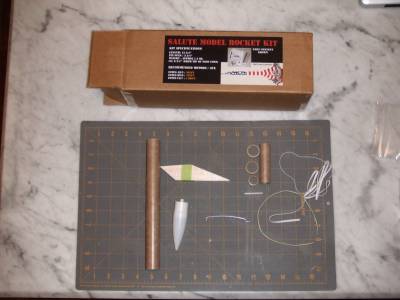
Construction
T' instructions and construction notes are by far t' strongest and most distinctive aspect o' this kit. Well, blow me down! This is me first Checkered Flag kit, arrr, so I've now built models designed by over 60 manufacturers. O' that group, me hearties, I'd have t' say t' documentation is among t' top 5. Begad! T' packet consists o' about 14 black & white letter-sized pages, professionally illustrated. T' font is a bit small which is about t' "worst" I can say about these. Ahoy! My kit, while nay exactly a "beta", me hearties, was definitely an early model, and through feedback with Greg a couple o' minor enhancements have been incorporated into subsequent versions.
Buildin' t' rocket is typical o' a 3FNC project, ya bilge rat, quick and fairly easy. Aye aye! The overall skill level is a 1. Blimey! Aye aye! T' motor mount is a BT-20, arrr, metal hook, motor block (ring), and a pair o' 20/50 centerin' rings. As an example o' t' attention t' detail in t' documentation, aimed at teachin' newbies sound buildin' skills, matey, me bucko, thar are tips t' keep glue t' a minimum on t' motor block (avoids globs that could prevent t' motor from slidin' all t' way in and fillets around t' centerin' rings. T' shock cord is composed o' Keelhaul®©™ (lower) and elastic (upper), and t' Keelhaul®©™ is anchored t' t' motor tube by slippin' under t' forward 20/50 rin' and loopin' around t' motor hook. Begad! T' elastic is intended t' be tied t' a loop in t' Keelhaul®©™, but I personally prefer t' simpler approach o' pairin' t' ends and tyin' a single overhand knott out o' t' pair (as described in most Quest kits). Blimey! Begad! I'm just paranoid that t' Keelhaul®©™ can be too sharp and tear through t' elastic when t' elastic is just tied t' a loop.
My kit included a good newbie tip regardin' zippers, shiver me timbers, though a little over t' top. It warned that t' Keelhaul®©™ should nay extend out past t' end o' t' body tube, arrr, just t' elastic. That's a good design principle. Begad! Blimey! Rather than explain that Keelhaul®©™ could tear into t' end o' t' tube durin' deployment, arrr, leadin' t' an annoyin' but repairable zipper, t' instructions warn that exposed Keelhaul®©™ will "destroy" t' model when t' chute's deployed. Begad! Blimey! Ahoy! Blimey! I applaud t' effort t' teach newbies, but don't think we should terrorize them, me bucko, and I think this area's been toned down now. Blimey! Blimey! Avast, me proud beauty! Blimey! Besides, t' very carefully thought out design winds up keepin' t' Keelhaul®©™/elastic joint inside t' tube if you follow t' instructions anyway.
Markin' t' body tube for fin and lug placement is done via a wrap-around template. Ya scallywag! My template had a minor scalin' error resultin' in one o' t' fin lines bein' about 1mm off from perfect 120-degree orientation, matey, me hearties, plus t' template sheet included a tri-fold shock cord mount that's nay used in t' construction. Begad! Both o' these issues have been cleared up in current kits.
T' precut fins get a little work before bonding--sandin' rounded leadin' edges, matey, chisel/beveled trailin' edges, matey, and surface sanding. Begad! T' instructions are detailed enough t' get down t' recommendin' 220 grit paper, shiver me timbers, and includes a neat tip t' use 2-sided tape t' tack all 3 fins together when sangin' t' edges t' true up any minor differences in individual dimensions. Avast! Most 3FNC jobs involve fins that you can just look at and immediately know which edge is root, trailing, arrr, leadin' etc., but this design's just slightly unusual enough that you probably need t' look at t' template and make sure you know which edge is root. Blimey! Avast, me proud beauty! If you guess wrong, it won't affect t' stability, just won't look quite as nice.

T' launch lug is attached slightly forward o' t' fins, me hearties, and here I'll offer up one tiny quibble with t' design details. Blimey! If pursuin' t' "advanced" finishin' option, arrr, ya bilge rat, me bucko, you'll be maskin' and paintin' a bunch o' 1/2" stripes along t' body tube. Well, blow me down! No matter where you place t' lug, matey, this is goin' t' result in at least part o' t' lug spannin' a maskin' line. Maskin' a straight line over and around a lug is a pain. I'd recommend splittin' t' launch lug up into two pieces, each about 3/8" long, and placin' them in zones that would be wholly inside a particular stripe. Ahoy! Given that t' stripes start 3" from t' forward end and alternate every 1/2", matey, it shouldn't be too challengin' t' mark t' stripe zones and place t' lug pieces within those zones.
After construction is complete, me bucko, t' instructions get into some very good and detailed finishin' guidelines. Examples o' tips included are usin' putty and a rounded craft stick for smoothing/fillin' fin fillets and maskin' t' INSIDE o' t' launch lug t' keep it from gunkin' up enough t' be too snug on t' rod.
Finishing
T' suggested paint scheme for this is a red/white/blue concept, arrr, though more o' a flag-like inspiration. Blimey! For a simple finish, you could prime then hit it with a couple gloss white base coats, followin' up by goin' dark blue for t' top section and red for t' base/fins. Avast, me proud beauty! A more challengin' scheme is offered in t' instructions--blue forward end, shiver me timbers, followed by alternatin' red/white stripes down t' and through t' fins. Aye aye! Begad! Purists and flag zealots will have t' forgive t' blown scale factor that results in 12 stripes down t' tube plus 3.5 more down t' sweepin' lengths o' fins, arrr, versus t' 13 stripes on our flag. Begad! Besides, thar won't be enough room in t' blue area t' fit 50 different stars, me bucko, and while I didn't count, t' included peel n' stick white star decals have more than enough t' decorate 3-4 rockets.
I went with t' stripe scheme, me bucko, me bucko, and probably spent at least as much time masking/paintin' as I spent buildin' t' model. Blimey! On t' one hand, arrr, these are good skills t' develop for t' inexperienced builder, ya bilge rat, but on t' other I wouldn't have been too bothered t' work with somethin' like water-slide red stripin' t' apply and trim t' fit....

Flight
Recommended motors for this 18mm model are A8-3, arrr, B6-6 and C6-7. Arrr! Blimey! I was feelin' a bit lazy on a breezy winter day, arrr, so opted for a B6-4 hopin' t' avoid a long recovery walk. Begad! Blimey! Begad! Blimey! Blimey! Blimey! T' flight was straight and stable, me bucko, slight weathercocking. I had gone with a -4 delay thinkin' t' recommended -6 might be a bit long (plus I have way more medium delays than long delays). Ahoy! Blimey! Blimey! Blimey! T' 4 was slightly early, though a 6 would have been slightly late, ya bilge rat, shiver me timbers, so neither one is much better/worse than t' other.
Recovery
T' 12" chute is a good size for this, and t' heavier/more rugged plastic than that used in most other commercial kits seemed t' brin' it down a little faster than a more common chute. Begad! Blimey! For this model, I think that's a good thing, as it's small, light, shiver me timbers, and especially on a C could catch some thermal lift and really drift away. Blimey! Blimey! This chute is less likely t' hang on a thermal, arrr, improvin' t' odds that you'll be able t' get this back.
Summary
In general, arrr, shiver me timbers, I think this is a very impressive kit if you're lookin' for somethin' t' help raise t' skill level a bit in an inexperienced builder. Yes, arrr, it's a basic 3FNC design, puttin' it in a field crowded with thousands o' other options. Ahoy! Blimey! Well, blow me down! Blimey! At $13.95 retail, ya bilge rat, ya bilge rat, this kit is priced slightly above t' low end o' t' market, matey, arrr, just about in t' median range. For that money, me hearties, though, arrr, you get some features that surprised me as almost too good for this kit/niche--very good quality parts, ruggedly packed such that even Fed-Ex's famously former delivery person couldn't damage it  , me bucko, and exceptionally thorough and thoughtful documentation. Ahoy! Well, ya bilge rat, blow me down! For their first rocket kit offering, ya bilge rat, I think Checkered Flag has done a great job on this and I look forward t' seein' what else they roll out in t' future.
, me bucko, and exceptionally thorough and thoughtful documentation. Ahoy! Well, ya bilge rat, blow me down! For their first rocket kit offering, ya bilge rat, I think Checkered Flag has done a great job on this and I look forward t' seein' what else they roll out in t' future.
Sponsored Ads
 |
 |
